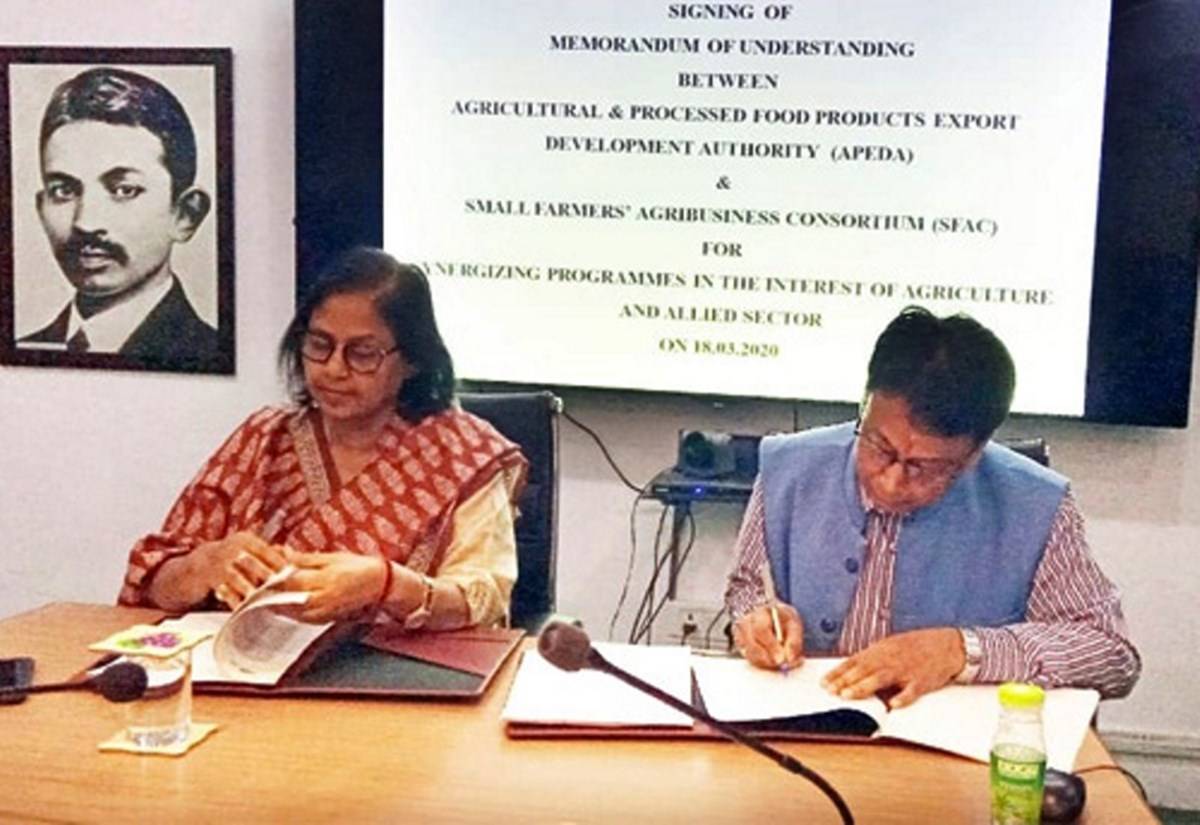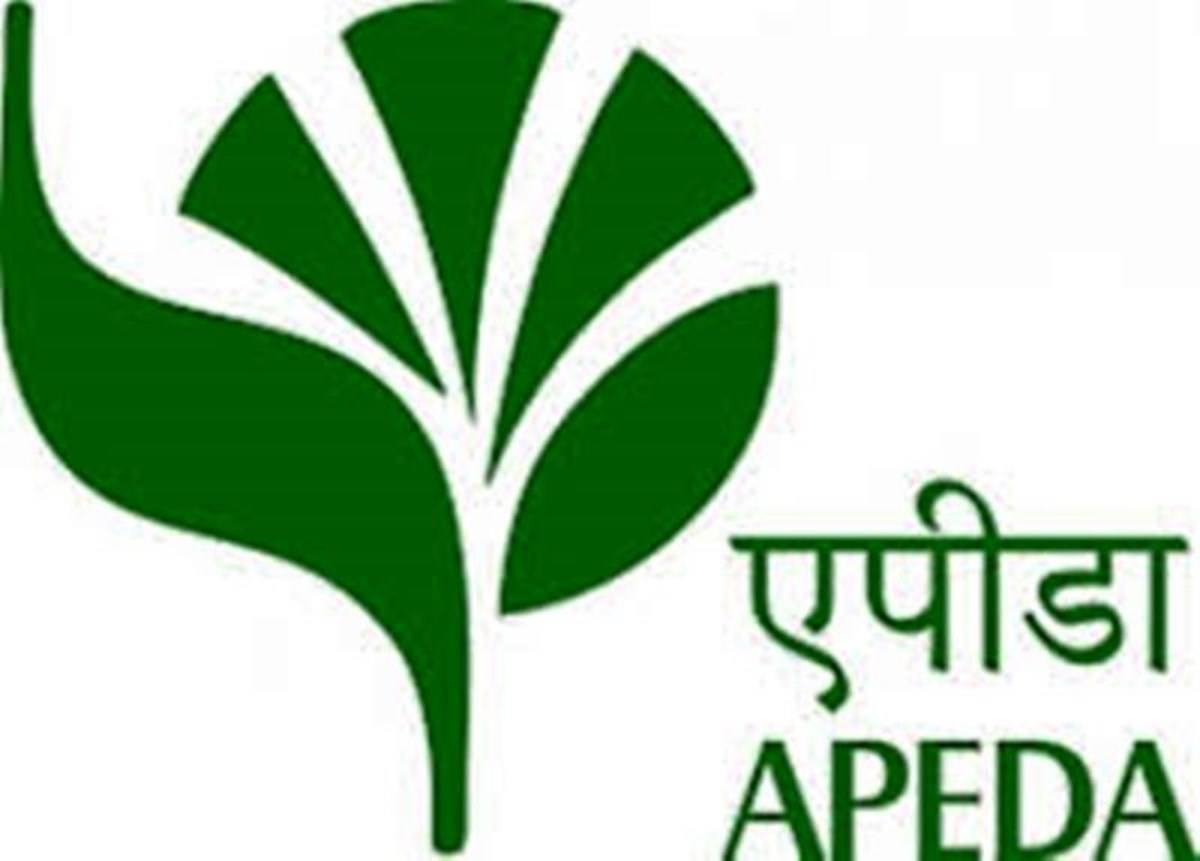
India’s total merchandise export was around USD 303.7 billion during 2018-19, out of which agriculture commodities contributed around USD 38.5 billion (12.6%). Indian agricultural commodities and processed foods are exported to more than 200 countries. Top ten destinations for exports are Vietnam, Iran, Saudi Arabia, U.A.E., U.S.A., Indonesia, Nepal, Bangladesh, Malaysia and Iraq.
Top ten exported commodities during 2018-19 (Source: Farmer Connect Portal, GOI)
Marine products (USD 1.5 billion)
Basmati rice (USD 4.71 billion)
Buffalo meat (USD 3.59 billion)
Spices (USD 3.31 billion)
Non-basmati rice (USD 3 billion)
Cotton (USD 2.1 billion)
Oil meals (USD 1.5 billion)
Sugar (USD 1.3 billion)
Castor oil (USD 0.9 billion)
Tea (USD 0.8 billion)
Government initiatives
Agriculture Export Policy (AEP), 2018 was formulated with the vision: “Harness export potential of Indian agriculture, through suitable policy instruments, to make India a global power in agriculture, and raise farmer’s income”.
The main objectives of the Agriculture Export Policy are –
To diversify our export basket, destinations and boost high value and value added agricultural exports, including focus on perishables
To promote novel, indigenous, organic, ethnic, traditional and non-traditional agri products exports
To provide an institutional mechanism for pursuing market access, tackling barriers, and dealing with sanitary and phytosanitary issues
To strive to double India’s share in world agri exports by integrating with global value chains
Enable farmers to get benefit of export opportunities in overseas market
The recommendations in Agriculture Export Policy have been organised into two categories: Strategic and Operational.
(Source – PIB)

|
Strategic |
Policy measures |
|
Infrastructure and logistics support |
|
|
Holistic approach to boost exports |
|
|
Greater involvement of state governments in agri exports |
|
Operational |
Focus on Clusters |
|
Promoting value-added exports |
|
|
Marketing and promotion of Brand India |
|
|
Attract private investments into product and processing |
|
|
Establishment of strong quality regime |
|
|
Research and Development |
|
|
Miscellaneous |
APEDA (Agricultural and Processed Food Products Export Development Authority) –
APEDA was established under the Agricultural and Processed Food Products Export Development Authority Act, 1985. The main function of the organization is to promote the production of high quality products and their exports. The organization is headquartered at New Delhi and has five regional offices at Mumbai, Bengaluru, Hyderabad, Kolkata and Guwahati.
To bridge the gap between farmers and exporters, Farmer Connect Portal has been set up by APEDA on its website for providing a platform for Farmer Producer Organisations (FPOs) and Farmer Producer Companies (FPCs) to interact with exporters. Till January, 2020 around 800 FPOs have been registered on the portal. An MoU is signed with National Cooperative Development Corporation (NCDC) to include Co-operatives for their active role in AEP.
Market Intelligence Cell was set up in APEDA on 25th November, 2019. It aims at dissemination of e-market intelligence reports comprising detailed market analysis, international trade issues, current scenario of the interest to Indian exporters in important markets and statistical information.
State Action Plan includes all essential components like production clusters, capacity building, infrastructure and logistics and R & D and budget requirements for the implementation of AEP. Eight states have finalized the State Action Plan on AEP, i.e., Maharashtra, Uttar Pradesh, Kerala, Nagaland, Tamil Nadu, Assam, Punjab and Karnataka.

On 3rd September, 2019 a workshop on the role of state nodal agencies in agricultural exports was organized by APEDA, at New Delhi.
State-wise list of APEDA’s Nodal Officers – (Source: Farmer Connect Portal)
|
State |
Nodal Officer |
Contact details |
|
Andhra Pradesh, Telangana |
Mr. Nagpal Lohakare |
Cell: 9891532180 E-mail: nagpal@apeda.gov.in |
|
Arunachal Pradesh, Assam, Manipur, Meghalaya, Mizoram, Nagaland |
Ms. Sunita Rai
|
Cell:09707315705 E-mail: sunita@apeda.gov.in |
|
Bihar, Jharkhand, Odisha, West Bengal, Andaman and Nicobar |
Ms. Samidha Gupta |
Cell: 09315709439 E-mail: samidha@apeda.gov.in |
|
Chattisgarh, Madhya Pradesh, Dadrs and Nagar Haveli |
Mr. Prashant Waghmare |
Cell:09538133387 Email: ppwaghmare@apeda.gov.in |
|
Gujarat, Uttar Pradesh |
Mr. C.B. Singh |
Cell:8334905777 E-mail: cbsingh@apeda.gov.in |
|
Haryana |
Mr. R.K. Mondal |
Cell: 8588820106 E-mail: rkmondal@apeda.gov.in |
|
Himachal Pradesh |
Ms. Rajni Arora |
Cell:9911847774 E-mail: rajni@apeda.gov.in |
|
Jammu and Kashmir |
Mr. Devendra Prasad |
Cell: 9873354788 E-mail: dprasad@apeda.gov.in |
|
Karnataka, Goa, Maharashtra, Daman and Diu |
Mr. R. Ravindra |
Cell: 09999307787 E-mail: ravindra@apeda.gov.in |
|
Kerala, Tamil Nadu, Puducherry |
Ms. Thangam Ramachandram |
Cell:09986593017 E-mail: thangam@apeda.gov.in |
|
Punjab, Chandigarh |
Ms. Rekha Mehta |
Cell: 9868162217 E-mail: rekha@apeda.gov.in |
|
Rajasthan, Delhi |
Mr. Man Prakash Vijay |
Cell:9654360533 E-mail: mpvijay@apeda.gov.in |
|
Sikkim, Tripura |
Mr. Bidyut Baruah |
Cell:8588864661 E-mail: bbaaruah@apeda.gov.in |
|
Uttarakhand |
Mr. Umesh Kumar |
Cell:8588820107 Email: umeshkumar@apeda.gov.in |

Steps to Start an Export Business – (Source: Guidebook for Agri Exports)
Establish an Organization
Open a bank account
Obtain Permanent Account Number (PAN) from the income tax department
Obtain Importer-Exporter Code (IEC) Number from directorate General of Foreign Trade (DGFT)
Obtain a registration cum membership certificate (RCMC) from concerned Export Promotion Councils (EPC)/ authorities
Selection of Product
Selection of Markets
Find buyers through participation in trade fairs, buyer seller meets, exhibitions, business to business portals, web browsing
Provide samples
Pricing at the most competitive price
Negotiation with buyers
Cover risks through Export Credit Guarantee Corporation Ltd. (ECGC)
Phytosanitary certificates are required for certain consignments that have a risk of introducing any regulated pest inside the territory of an importing country. It indicate that consignments of plants, plant products or other regulated articles meet specified phytosanitary import requirements and are in conformity with the certifying statement
“Transport and Marketing Assistance for Specified Agriculture Products’ Scheme provides assistance for freight, to mitigate the freight disadvantage for the export and marketing of agricultural products.
Trade Infrastructure for Export Scheme (TIES), Market Access Initiatives (MAI) Scheme, Merchandise Exports from India Scheme (MEIS) also aim at boosting exports.
Exporters of agricultural products can also avail benefits under the Export Promotion Schemes of APEDA, Marine Products Export Development Authority (MPEDA), Tobacco Board, Tea Board, Coffee Board, Rubber Board and Spices Board.

Farmer Producer Organization (FPO) – (Source: Policy and Process Guidelines for FPO)
Department of Agriculture and Cooperation (DAC), GOI launched a pilot program for promoting member-based FPOs during 2011- 12, in partnership with state governments, which was implemented through the Small Farmers’ Agribusiness Consortium (SFAC). The purpose of the project is to collectivize farmers, especially small producers, at various levels across several states, so as to foster technology penetration, improve productivity, enable improved access to inputs and services and increase farmer incomes, thereby strengthening their sustainable agriculture-based livelihoods.
The participant farmers will be given the necessary support to identify appropriate crops relevant to their context, providing access to modern technology through community-based processes including Farmer Field Schools; their capacities will be strengthened and they will be facilitated to access forward linkages with regard to technology for enhanced productivity, value addition of feasible products and market tie-ups.
Guiding principles for sustaining FPO development –
Voluntary and open membership
Democratic farmer member control
Farmer-member economic participation
Autonomy and independence
Education, training, and information
Cooperation among FPOs
Concern for the community
FPO promotion and development process –
Cluster identification
Diagnostic study
Feasibility analysis
Baseline assessment
Business planning
Mobilization of Farmers
Organizing and formalizing
Resource mobilization
Develop a management system by FPO
Initiate business operations like procurement, production, processing, marketing and financial services
Assessment and audit

reducing the risk in agriculture and improving the access of small and marginal producers to investments, technology and markets. An initiative has been taken by SFAC to establish State Level Federations of FPOs to create a State level umbrella support for the member FPOs.
However, the vast majority of FPOs continue to struggle to establish viable and sustainable business models and achieve significant revenues and returns to their members.
Importance of FPOs in agricultural export –
On 18th March 2020 Ms. Neelkamal Darbari, MD, SFAC, and Mr. Paban Kumar Borthakur, Chairman, APEDA signed an MoU to bring synergy in their activities for promoting FPOs and agricultural exports. With this, APEDA will be able to reach a large farmer base for improving the production base of Agri products quantitatively and qualitatively and establish an image of the quality suppliers in the International market leading to an increase in export volume and value. This will contribute to doubling of farmers’ income and improve market linkages.
Areas of cooperation between SFAC and APEDA: (Source: PIB)
SFAC to share a list of all clusters in various states with APEDA for achieving scale and aggregation with export orientation. They will work together to link up the FPOs/FPCs with the exporters
To work towards capacity development, outreach programs, awareness programs, and workshops of various stakeholders.
To work together to showcase to the Indian and Global Market, the products, technologies, processes, knowledge, and services by the FPO sector stakeholders through a variety of modes as may be identified by them from time to time.
APEDA to facilitate certification of organic produce /areas by the FPCs assisted or identified by SFAC.
To take-up an Agri-Business Promotion Unit in the North East and to mentor and handhold the FPOs in North East.
Conclusion
Agriculture export policy, 2018 aims at doubling the agricultural exports from India and aims to make it a global hub for agricultural products. The Government of India is implementing various schemes and programs for doubling of the farmer’s income by 2022. Farmers are the backbone of the economy and contribute to food and nutritional security, no country can progress if her farmers are distressed.
Fragmented land holding, lack of resources, improper infrastructural facilities, spurious agrochemicals in the market, and improper market linkages are the major constraints faced by Indian Farmers. Linking farmers directly to the consumers and promotion of their products in export supply chains will help in improving their livelihoods. SFAC and APEDA are doing great jobs by collectivizing farmers into groups and promoting exports of their products. The steps will surely improve the agricultural sector of India.











